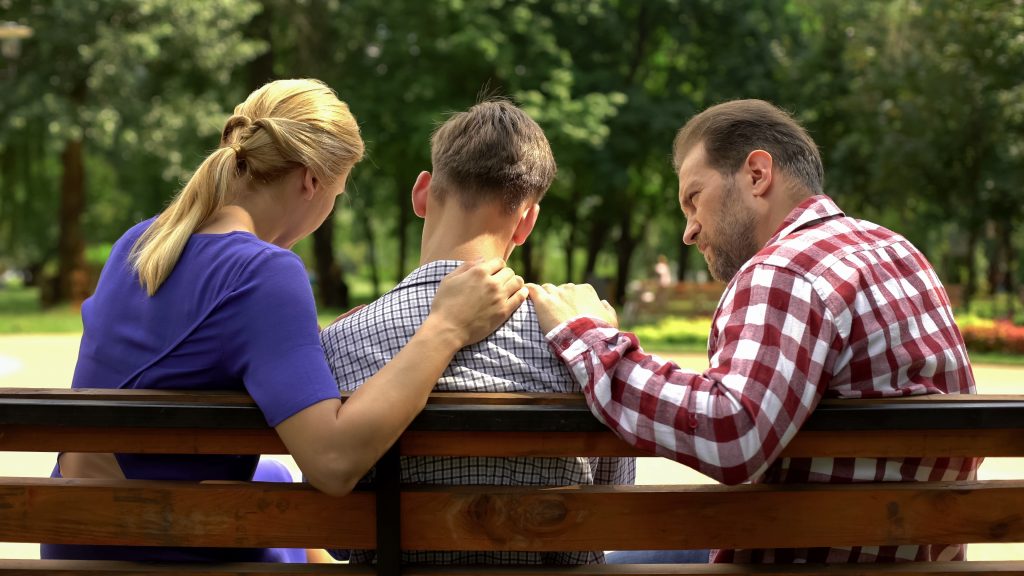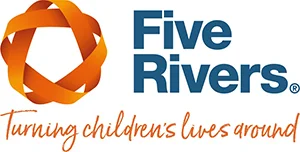Responding to COVID-19 Anxiety and Uncertainty – Getting Through it Together
Friday 05 June 2020
Last updated: Monday 18 November 2024
by Richard Cross, Director of Clinical Services, Five Rivers Child Care

“The oldest and strongest emotion of mankind is fear, and the oldest and strongest kind of fear is the fear of the unknown” – H. P. Lovecraft.
We find ourselves in such a challenging time characterised by uncertainty and change. I wanted to pass on some thoughts to all the carers, residential staff, and teachers who are supporting children in Five Rivers care.
There are four main points I want to explore: safety, information, problem-solving and finally, anxiety.
How can I make a child feel safe?
There is an analogy about safety which is often used. When a parent and child are on a plane together and the oxygen drops, a parent is always instructed to put on their oxygen mask first before their child’s. In the current crisis given the guidance of staying at home, carers, parents and children are now spending so much more time together. It means more than ever that the adults need to regulate their own anxiety. As adults, we must be mindful that children will be watching and monitoring us for cues as to how safe it is, and how anxious we can be. It is okay in this situation to let children know that being “worried or anxious can be a part of our lives at times”, but that we can regulate our emotions.
Bottling up
I recently delivered a training to the leadership team in Five Rivers, during which I used a prop of a bottle of water. I took the top off the bottle and shook it; it’s no surprise that water spilled out. Naturally, it was because there was water in the bottle. I used the analogy that the water is our emotional material filling up the bottle. We cannot stop the shaking – our worries, triggers and fears. We need to try and work together to make sure that our bottles stay as empty as possible. We need to make sure that we do not catastrophise and are careful to not make promises that cannot be kept.
Keep structure and routines
Here are some important routines to establish
– Play routines
– Chore routines
– Homework routines
– Connection routines (time to connect to others in a novel way)
– Separateness routines (time for ourselves)
Useful Breathing Video
The key role of the adult is to model safety and demonstrate management of anxiety. Sesame Street has a child-friendly example of ‘Belly Breathe’ – diaphragmatic breathing used in meditation and relaxation techniques –
https://www.youtube.com/watch?v=_mZbzDOpylA2What information do I really need?
Our media diet needs to be healthy. As adults, we need to know what is going on. But do we need Sky or BBC News continuously going on in the background? We need to be aware of how media is attention-seeking and the impact this has upon us. Maybe it’s time to stay focused on the things we like to do, such as read books, listen to music and perhaps going back to simpler things in our spare time.
How can I put the emphasis on problem solving?
The current crisis gives us an opportunity to reinforce the positive strengths and experiences that children have had, which have allowed them to be able to get through lots of challenges in the past.
What can I do to control my own anxiety and feelings of uncertainty?
We are likely to worry about new risks rather than known risks and with COVID-19 it’s something which is largely unknown so there is understandable anxiety surrounding it. If we label anxiety as bad or push it away, our brains see this anxiety as a problem, and push more stress hormones into our bodies. This is counterintuitive. So, what can we do to support ourselves?
i.) Accept anxiety – don’t push it away
The anxiety isn’t the problem. It doesn’t feel good, but we can tolerate it and find a way to manage it. Being able to accept and almost welcome it is the tricky bit, however. Try speaking kindly to that part of you, e.g. “I was expecting you to be around Anxiety, but I can tolerate you and I am able to learn ways to manage you”. By doing this you are accepting and validating your own feelings. Therefore, their threat reduces.
ii) Remind ourselves we CAN tolerate uncertainty.
It’s important we can identify and bring into our awareness that we have capabilities of being able to manage uncertainty. One way to mitigate against anxiety is for us to feel productive and not to feel like we are ‘stuck’ or paralysed. This requires being able to step back and say “okay, what can I do today?” Identify things that help keep you emotionally grounded. Our perspective is the most powerful thing that we can control in any situation. Yes, it’s scary, but fear, panic and worry are not preparation. Stressful thought patterns such as rumination and pessimism are not helpful to us, so in addition to washing our hands, we need to cleanse our minds to offset catastrophic thinking.
iii) What is the best thing I can do when I feel down about myself?
I would say, encourage self-compassion.
“Self-acceptance is my refusal to be in an adversarial relationship with myself” – Nathaniel Branden.
We can sometimes tend to ‘beat ourselves up’ due to having feelings of being frightened and scared. We need to be able to ‘give ourselves a break’.

Richard Cross is the Director of Five Rivers Clinical Services team. Richard is a UKCP registered and accredited Psychotherapist and Child Psychotherapist with expertise in helping young people with trauma-disorders, dissociative disorders from childhood abuse, anxiety, addictions and phobias. Richard leads a team of 8 permanent Clinical and Counselling Psychologists and Psychotherapists and a growing Five Rivers Affiliate Network of practitioners.
